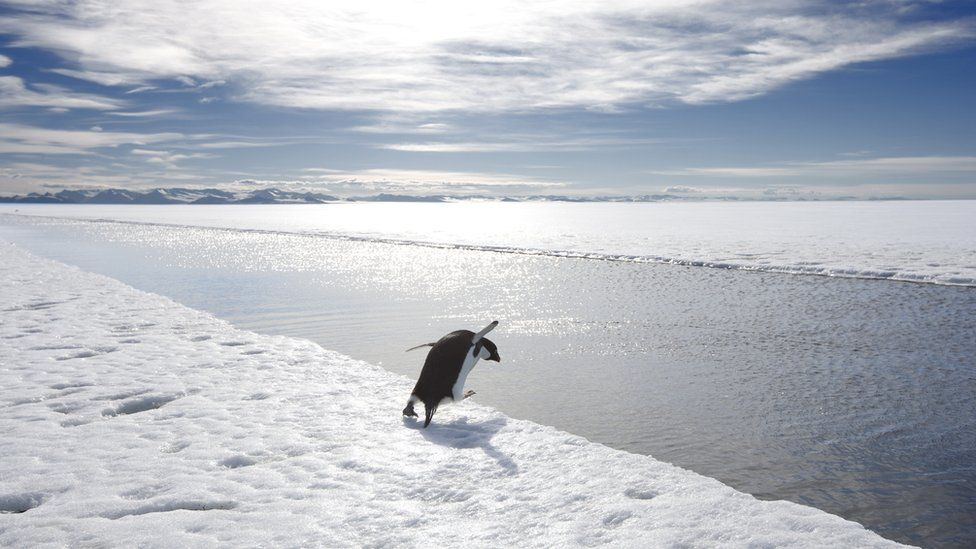Nations push to protect Antarctica's 'last ocean'
- Published

Campaigners believe a proposal to establish a vast marine reserve in the seas around Antarctica will finally be accepted this week.
An international commission is looking to safeguard a massive section of the Ross Sea, home to penguins, petrels and killer whales.
The proposed marine protected area (MPA) would ban fishing and drilling in a region dubbed "the last ocean".
Experts say it could set a precedent for other areas of the high seas.
Consisting of 24 countries plus the European Union, the Commission for the Conservation of Antarctic Marine Living Resources (CCAMLR) was established in 1980 with a mission to protect the common resources of the Southern Ocean.
While Antarctica itself is protected by the Madrid Protocol which declares the region a "natural reserve, devoted to peace and science", the surrounding waters have increasingly become the focus for commercial fishing fleets, attracted by vast quantities of krill and toothfish.
One of the first attempts to limit these activities came from the UK which proposed the creation of the South Orkney Marine Protected Area at CCAMLR in 2009.
While this was successful in limiting fishing in an area of some 94,000 sq km around the South Orkneys, attempts since then to give protection to much larger bodies of water around Antarctica have become bogged down in political disputes.
At the end of negotiations last year, Russia was seen as the one country holding out against a consensus on the Ross Sea.
Other proposal for MPAs in East Antarctica and the Weddell Sea are also on the table this year but there is a growing belief that Russia will support the Ross Sea option this time round.
President Putin has designated 2017 as the Year of Ecology and the country has recently expanded an MPA around Franz Josef Land in the Arctic.
"People have come into it feeling very positive that this could be the year," said Cassandra Brooks, a phd student at Stanford University who has recently published a study on the workings of CCAMLR.
"Despite the US and Russian tensions in other parts of the world, historically countries have worked wonders in the Antarctic and I hope this will be a case where we see science and diplomacy working."
While the Ross Sea, its shelf and slope only comprise 2% of the Southern Ocean they are home to 38% of the world's Adelie penguins, 30% of the world's Antarctic petrels and around 6% of the world's population of Antarctic minke whales.
The region is important to the rest of the planet as the upwelling of nutrients from the deep waters encounter currents which carry them around the world.
Krill are a staple food for species including whales and seals, and their oil is critical for salmon farming. However there are concerns that overfishing and climate change are having significant impacts on their numbers.
The current proposal, introduced by New Zealand and the US, would see a general protection "no-take" zone where nothing could be removed including marine life and minerals.
There would also be special zones where fishing from krill and toothfish would be allowed for research purposes.
"Right now, 24 countries and the EU are negotiating what could be the first-ever large-scale marine sanctuary in international waters," said Mike Walker, from the Antarctic Ocean Alliance, a coalition of environmental campaigners.
"An agreement would be an historic move to protect the ocean," he said.
One of the key questions in the negotiations is how long the MPA should last. China is on the record as stating it believes that 20 years is long enough. Many conservationists say this is far too short, given the lifespan of creatures that life in the Ross Sea, such as whales.
"We'll see what it is," said Cassandra Brooks.
"It will have value for the times it's in place but can it meet its objectives in such a short duration? That's something that a lot of people are worried about."
One of the other big concerns that could halt the Ross Sea proposal is the fact that it might set a precedent for other high seas negotiations around the world, such as in the Arctic and in attempts by the UN to develop a new marine biodiversity treaty.
"For some states it comes down to economics, for others it is about setting a precedent," said Cassandra Brooks.
"For others it might be cultural, a lot of people might say that MPAs are a very western thing so there could be some breakdown there.
"I am optimistic, sometimes it just takes time and the political window of opportunity - are we in that? It remains to be seen."
Follow Matt on Twitter @mattmcgrathBBC and on Facebook.